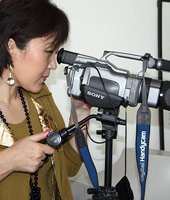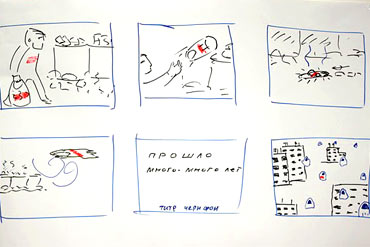Kazakh TV journalists improve their capacity to report on environmental issues
25-11-2010 (Almaty)

Shooting climate change research
© UNESCO/Sergey Karpov
A workshop on Capacity Building of TV News Reporters for Environmental Sustainability took place last week in Almaty. It aimed to improve the ability of TV journalists in Kazakhstan to conduct research and present balanced coverage of environmental issues. The event was supported by UNESCO’s International Programme for the Development of Communication (IPDC).
Kazakhstan’s glaciers are retreating, its agricultural land is being depleted, and diverse animal and vegetable life is under threat. How can TV journalists convince sceptical editors to let them cover these important environmental issues? How can they make these issues interesting to TV audiences? These were the main challenges of the five-day event held at the Kazakhstan Institute of Management, Economics and Strategic Research (KIMEP) in Almaty.
As one of the participants, Zhidegul Abdezhedelkyzy, put it, “TV channels do not always take into account the functions of development and education. I believe that environmental education should be one of TV missions. After this workshop I would like to prepare an environmental television magazine for the KazNU TV School."
Participants began the workshop by brainstorming on key environmental issues facing the country. They completed exercises on environmental data sources, statistical analysis, visual storyboarding and information graphics. National experts presented current scientific research, focusing on three key issues: climate change and the melting of glaciers, degradation of agricultural land, and biodiversity.
Working in groups, participants shot footages and interviews on these issues at three locations: Chimbulak mountain skiing base, the UNDP pilot agricultural project and the Almaty National Park. They will conduct additional research and edit their stories for broadcast and webcast.
Trainer David Mould, Professor of Media Arts and Studies at Ohio University (USA), stressed that covering the environment is not only about the endangered and the exotic - the so-called “polar bear frame.” Every environmental story involves politics and policy making, and many are directly linked to poverty, economic development and health.
“Creating programmes on environmental issues raises a number of complex issues related to business, politics and public health," said Yermek Kabylbekov, employee of TV Sairam in southern Kazakhstan.
The workshop was sponsored by UNESCO’s IPDC, the Asia-Pacific Institute for Broadcasting Development (AIBD) and hosted by the Regional Environmental Centre for Central Asia (CAREC).
As one of the participants, Zhidegul Abdezhedelkyzy, put it, “TV channels do not always take into account the functions of development and education. I believe that environmental education should be one of TV missions. After this workshop I would like to prepare an environmental television magazine for the KazNU TV School."
Participants began the workshop by brainstorming on key environmental issues facing the country. They completed exercises on environmental data sources, statistical analysis, visual storyboarding and information graphics. National experts presented current scientific research, focusing on three key issues: climate change and the melting of glaciers, degradation of agricultural land, and biodiversity.
Working in groups, participants shot footages and interviews on these issues at three locations: Chimbulak mountain skiing base, the UNDP pilot agricultural project and the Almaty National Park. They will conduct additional research and edit their stories for broadcast and webcast.
Trainer David Mould, Professor of Media Arts and Studies at Ohio University (USA), stressed that covering the environment is not only about the endangered and the exotic - the so-called “polar bear frame.” Every environmental story involves politics and policy making, and many are directly linked to poverty, economic development and health.
“Creating programmes on environmental issues raises a number of complex issues related to business, politics and public health," said Yermek Kabylbekov, employee of TV Sairam in southern Kazakhstan.
The workshop was sponsored by UNESCO’s IPDC, the Asia-Pacific Institute for Broadcasting Development (AIBD) and hosted by the Regional Environmental Centre for Central Asia (CAREC).
 Presentation of TV programme, The history of plastic pack
Presentation of TV programme, The history of plastic pack© UNESCO/Sergey Karpov
Related themes/countries
· Kazakhstan
· Training of Media Professionals
· International Programme for the Development of Communication (IPDC)
· Weekly newsletter
Share this story:














